First, I would like to apologize for my co-responsibility for the killing of 1000 penguins in Antarctica. I flew to Angola, and with my CO2 emissions I caused the ice to melt far too quickly. And then cute baby penguins drowned. Sorry, sorry.

I thought that you could not travel overland from Denmark to Angola. But along the way, in the Basque country, I actually met a beekeeper who had driven all the way through Africa to South Africa. In a car. But I flew, sorry. Flying is also considerably faster, I’m sure, than driving a car.
I was invited to a language conference in Angola. At first I was hesitant on whether I should go there, it was far away, expensive, and I did not have the program. Luanda, Angola’s capital, is also the fourth most expensive in the world when it comes to hotels. And we had to spend the night there twice. But our conference was in the mountains, in the municipality of Libolo, four or five hours’ drive from the capital. Half of the trip on sandy roads.
Should you bring malaria pills? Yes, said the organizer. No, said some other participants. There are mosquitoes that transmit the disease, and the disease is quite unpleasant. You must therefore avoid being stung. I was told at the pharmacy in Aarhus that you just get really sick from it. The disease is usually not fatal if you have a good immune system. Throughout the entire journey, I have only seen two mosquitoes, one in the hotel and one on the plane. And my Angolan co-passenger quickly killed it.
This contribution was supposed to be about language. It’s Lingoblog, after all. I brushed up on my Brazilian Portuguese (which I once spoke reasonably well) before the journey, but it didn’t help much. All week I found it difficult to understand people speaking Portuguese. The written language is not that difficult, but when they speak … And Portuguese speakers from Brazil there told me that they themselves had a hard time following along sometimes. And those from Portugal can be impossible to understand. I was not the only one from Denmark. Ana Paulla Braga Mattos, from Brazilian Studies in Aarhus, was also there. And involved in the organization of the conference.
I have done most of my fieldwork not in Africa, but with indigenous people in North America, and there it is sad that in that part of the world almost none of the original 100 languages are still learned by children. They all die out. There are many complex languages there. In a few years, there will be no polysynthetic languages left in the universe. Sad for our lonely planet.
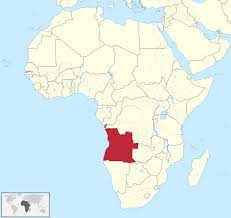
In Africa it is apparently very different. There, the vast majority of people south of the Sahara probably learn a European language, or Arabic, and in addition, almost everyone also quickly picks up on the predominant African language, or languages, in that region. They don’t always see their language as a “real” language, but they speak it anyway. It is difficult to find an African who is not multilingual. But Angola is special in the African context.
I was picked up at the airport (after the person said he had prepaid my VISA and therefore wanted 120 US dollars, which later turned out to be a lie). When I arrived at the agreed place in Luanda it was half an hour before the agreed time. The other conventioneers, including the general (more on him later), had already left on the chartered bus, however. I was surprised about the program change, but not in a panic. The bus had left, yes, but it will work out. I was offered breakfast in the five-star hotel, and then I looked around at unknown luxuries. And yes, five hours later I was sitting in a car with friend and German-Ghanaian polyglot Kofi Yakpo, a Franco-Angolan linguist and besides, the one they called the professor. By the way, they also called me that in Angola (though not at AU). And the professor, José Domingo Pedro, worked for the Ministry of Education. It was his task to stimulate the use of African languages at the expense of Portuguese. It is not easy.
Angola is 30 times larger than Denmark. There are 50 or 25 times as many native languages as in Denmark. But many Angolans do not speak any native languages.
In Angola, it is estimated that 40% of the population speaks Portuguese, and that means here: ONLY Portuguese. They don’t speak any other languages. Almost 80% of the country speaks Portuguese. Before the conference, Kofi Yakpo had visited friends in a provincial town far away from the main site, and he said that there he heard children speaking only Portuguese to each other. He has visited all countries in West Africa, and several others in other parts of Africa, but he said he has never experienced something similar. Children who do not speak an African language with each other.
The professor had a difficult task. Professor Pedro wasn’t entirely optimistic about the future, but he tried his best. He said that almost all languages in his country belong to the large Bantu language family, which is spoken in many countries from Cameroon to South Africa, and which is part of the very diverse Niger-Congo language group. The three largest languages are KiKongo, Kimbundu and Umbundu. KiKongo is spoken in the north of the country, but also in the neighboring countries to the north. Kimbundu is spoken south from KiKongo and Umbundu south from there. But then there are also some Khoisan languages spoken in the south, not far from the border with Namibia.
African languages are also completely invisible in the linguistic landscape in Angola. This applies not only to the capital, but also to villages and provincial towns. I have not seen a single sign in an African language, not a single advertisement or graffiti text. The only African that can be seen of the country’s Bantu language heritage are place names, which are the only linguistic signs to remind you of a pre-colonial time in the country. There are very few people who could be upset about that.

There are actually quite a few advertising signs in Angola in Chinese, I have seen more of them than signs in African languages.
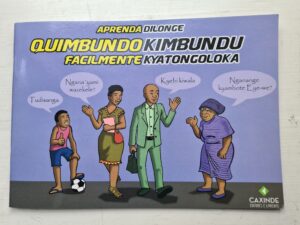
There is not a single child in Angola who receives school education in their African mother tongue. There are no ABC books, school books in the three major languages, and of course not for the small languages either. Just think about it. 20 million children in Angola do not receive education in their mother tongue. Therefore they cannot read in their mother tongue either, only Portuguese. However, I found a small textbook on Kimbundu in the local market, which I bought for 2000 kwanzas. I am in the process of learning the language. At the market you could also buy a painting, a portrait of the general and two of his books.
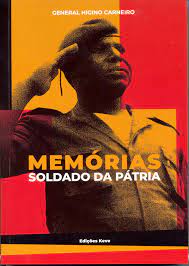
I mentioned the general already. There were a lot of names of sponsors of the conference, but it turned out to be the same person behind all (?) organizations. He owned the hotels, dance groups, orchestra, the football club, restaurants, the library in town (it was named after his mother anyway), quite a few cars and buses, a coffee plantation and reportedly also some aircraft. I shook his hand and now I am two handshakes away from that the late former Angolan president, two popes, President Lula of Brazil, Fidel Castro and Nelson Mandela. Just to name a few. The general was a man of influence, and nosy-rich and also just rich, money-wise. And he was a guitarist and singer. He was popular, but that always attracted some enmities as well. He was the person who had led peace negotiations in the 22-year Angolan civil war (1975-1997), in which Cuba, Russia, the United States and South Africa tested their arsenals of weapons on the warring parties in Angola. Now there is peace in the country, and the Angolans are happy about that.
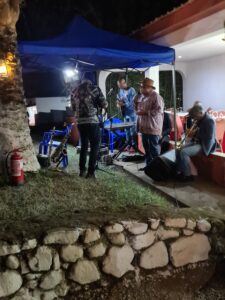
I asked the general what languages he spoke. Portuguese, of course, but also good French, Spanish and English (as I have experienced myself), and a bit of Russian and Chinese, he said. No, he didn’t speak Kimbundu or Umbundu, but he did speak two languages which I assume were some of the minor languages.
Many years ago, locals and linguists who were born there, together with linguists from Brazil, initiated a Libolo project, which will map both the local Portuguese and the Bantu languages spoken in the province, especially around the provincial capital Calulo in the province of Cuanza Sul.
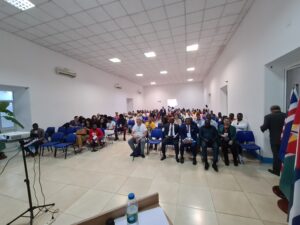
The locals were also very involved in the conference. They were proud that world famous linguists came to Angola. I estimate that some 200, in addition to the 30 conference participants, came to my plenary talk, even though it was in English and not in Portuguese, a language which, as I said, is much easier for them.
Friend Anzo had already spent a week in Libolo, and it was as if he knew everyone and that everyone knew him when you walked around the town; he greeted all the mamas and papas in Kimbundu. He believed that the further people lived from the central square, the more Kimbundu they spoke. But you don’t see it in written form, and you hardly hear it.
Angola was a special experience. The people are incredibly friendly and welcoming. But not a shining example of linguistic diversity, which has become less and less over time.
Peter Bakker is a linguist at Aarhus University. He is a specialist in new languages, i.a. creole language. Creole is not spoken in Angola.








1 thought on “Languages in Angola”